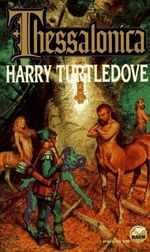| Thessalonica | |
|---|---|
 | |
| Author | Harry Turtledove |
| Language | English |
| Genre(s) | Fantasy |
| Publisher | Baen |
| Publication date | 1997 |
Thessalonica is a historical fantasy novel by Harry Turtledove and published by Baen in 1997. It is set in a universe closely paralleling our own but one where henotheistic gods impact human affairs.
Thessalonica tells the story of the siege of the Christian city in Byzantine Greece by invading Slavs and Avars in 597 CE. The novel's protagonist, George, is a simple shoemaker who lives in the city and obtains the aid of several survivors of the endangered Ancient Greek pantheon, including centaurs and satyrs, to assist the Christian God and saints against the Slavic gods which command their own supernatural beings. Within days the city is surrounded, and though the strength of the Christian God enables the population to keep the barbarian hordes at bay, George realizes they may need more to defeat their enemies. With the help of a pious but broad-minded priest named Father Luke, George convinces the satyrs, centaurs and others to save the city.
While Christianity in the universe of Thessalonica has the same basic doctrines and theology as in OTL, prayers and other religious acts have a far more direct and tangible result. Prayers often act as a kind of magic spell, aimed at achieving a direct physical effect and often succeeding - especially when they are the prayers of a powerful cleric and/or when they are the prayers of an entire congregation, aimed and focused by such a powerful cleric towards a specific aim. The blessing of weapons is not just a way of giving moral support and sanction to a war being waged - rather, blessing a weapon can directly and perceptively increase the power of that specific weapon, and this effect is recognized by soldiers and taken into account in planning battles.
It is of help to the Church that various Christian Saints occasionally manifest themselves, in a clear and unambiguous way leaving no doubt about their veritable existence; on occasion, so does God Himself. On the other hand, various non-Christian deities, gods, demigods and other beings related to other systems of belief also manifest themselves, and just as clearly and unambiguously leaving no doubt about their own veritable existence. Christian clerics still assert that their God is supreme and will inevitably win out in the end against all competitors. More bigoted Christian clerics such as Bishop Eusebius regard all non-Christian beings as demons, to be fought, exorcised and extirpated as soon as possible. More broad-minded clerics such as Father Luke are ready to extend their Christian charity also to non-Christian beings such as centaurs and satyrs and believe that they, too, have a role in God's plan for the world. However, some people entertain occasional doubts as to the certainty that the Christian God is truly superior to all rivals and that his eventual victory is assured.
Connections to other works
The Case of the Toxic Spell Dump deals with a world where the deities of varying religions compete frequently for henotheistic living-space in the Confederated Provinces, a fantasy-heavy version of the United States, at the close of the 20th century. In a database prepared by Turtledove's assistant Steven Silver, both novels are listed as taking place in a shared universe. However, Turtledove himself has never confirmed a link between the two novels, which are quite different in tone, structure, and character treatment. The world of Thessalonica appears to be essentially OTL with magic added in, whereas Spell Dump has an undercurrent of alternate history.
"The Horse of Bronze", set apparently well before 1250 BC, features very similar character treatments of centaurs, and may be a prequel to Thessalonica. The events depicted in "Horse" may be the backstory alluded to in the novel, although it could also be argued that Turtledove is simply is making two different adaptations of the original centaur myths.
Household Gods, written by Judith Tarr and Turtledove, depicts the daily life of lower middle class artisans in a Roman provincial city (Carnuntum) which faces the emergency of a barbarian invasion. While both books have elements of fantasy (the intervention of various gods and deities, time travel, and/or magical warfare), the mundane details of daily life are depicted with realism, derived from Turtledove's thorough academic studies.
Gunpowder Empire (first volume of Crosstime Traffic Series), a science fiction/alternate history novel of a longer lived Roman Empire, similarly focus on daily life in a provincial townprior to a great siege by an enemy power.
Laura Frankos' "The Old Grind" takes a historical battle - the Siege of Chartres in 911 - and adds in fantasy beings among the combatants.
| ||||||||||||||